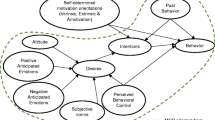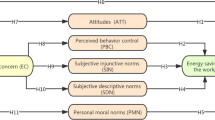Abstract
The residential sector has become a significant energy consumer and carbon emitter in China. Behavior-driven solutions are widely used for building energy conservation. Research gap exists to understand the impacts of personality traits on the individual differences in energy conservation behavior. This study aims to explore the roles of Big Five personality traits in household energy conservation behavioral process. The research connects the Big Five personality traits with attitude in the theory of planned behavior. Through a detailed questionnaire-based survey, the study collected demographics, energy conservation intentions, and personality characteristics from households in two typical communities in Xi’an China. The sample size of the survey consists of 213 households. The structural equation modelling results show that two personality traits play critical roles in household energy conservation behavioral process. Agreeableness positively contributes to energy conservation attitude while Extroversion presents a negative relationship with the attitude towards household energy conservation. The research offers a shred of an empirical demonstration on the connection between personality traits and pro-environmental behaviors. The findings would contribute to the energy conservation campaigns in China.
Access this chapter
Tax calculation will be finalised at checkout
Purchases are for personal use only
Similar content being viewed by others
References
Zhang, Y., He, C.-Q., Tang, B.-J., Wei, Y.-M.: China’s energy consumption in the building sector: a life cycle approach. Energy Build 94, 240–251 (2015)
Yu, Z., Fung, B.C., Haghighat, F., Yoshino, H., Morofsky, E.: A systematic procedure to study the influence of occupant behavior on building energy consumption. Energy Build 43(6), 1409–1417 (2011)
Klein, L., et al.: Coordinating occupant behavior for building energy and comfort management using multi-agent systems. Autom Constr 22, 525–536 (2012)
Anderson, K., Lee, S., Menassa, C.: Impact of social network type and structure on modeling normative energy use behavior interventions. J Comput Civil Eng 28(1), 30–39 (2014)
Kosonen HK, Kim AA (2017) Advancement of behavioral energy interventions in commercial buildings. Facilities
Liu, X., Wang, Q., Wei, H.-H., Chi, H.-L., Ma, Y., Jian, I.Y.: Psychological and demographic factors affecting household energy-saving intentions: a TPB-based study in Northwest China. Sustainability 12(3), 836 (2020)
Zhang, Y., Wang, Z., Zhou, G.: Antecedents of employee electricity saving behavior in organizations: an empirical study based on norm activation model. Energy Pol 62, 1120–1127 (2013)
Hong, T., Chen, C.-F., Wang, Z., Xu, X.: Linking human-building interactions in shared offices with personality traits. Build Environ 170, 106602 (2020)
Kassin SM (2003) Essentials of psychology. Prentice Hall
Tang CMF, Lam D (2017) The role of extraversion and agreeableness traits on Gen Y’s attitudes and willingness to pay for green hotels. Int J Contemp Hospit Manag
Poškus, M.S., Žukauskienė, R.: Predicting adolescents’ recycling behavior among different big five personality types. J Environ Psychol 54, 57–64 (2017)
Yazdanpanah M, Hadji Hosseinlou M (2017) The role of personality traits through habit and intention on determining future preferences of public transport use. Behav Sci 7(1):8
Munyaneza, J., Wakeel, M., Chen, B.: Overview of Rwanda energy sector: from energy shortage to sufficiency. Energy Proc 104, 215–220 (2016)
Kaygusuz, K.: Energy services and energy poverty for sustainable rural development. Renew Sustain Energy Rev 15(2), 936–947 (2011)
Lo, Siu Hing, Peters, Gjalt-Jorn Y., van Breukelen, Gerard J.P., Kok, Gerjo: Only reasoned action? An interorganizational study of energy-saving behaviors in office buildings. Energ Effi 7(5), 761–775 (2014). https://doi.org/10.1007/s12053-014-9254-x
Obaidellah, U.H., Danaee, M., Mamun, M.A.A., Hasanuzzaman, M., Rahim, N.A.: An application of TPB constructs on energy-saving behavioural intention among university office building occupants: a pilot study in Malaysian tropical climate. J Hous Built Environ 34(2), 533–569 (2019). https://doi.org/10.1007/s10901-018-9637-y
De Leeuw, A., Valois, P., Ajzen, I., Schmidt, P.: Using the theory of planned behavior to identify key beliefs underlying pro-environmental behavior in high-school students: Implications for educational interventions. J Environ Psychol 42, 128–138 (2015)
Ru, X., Wang, S., Yan, S.: Exploring the effects of normative factors and perceived behavioral control on individual’s energy-saving intention: an empirical study in eastern China. Resour Conserv Recycl 134, 91–99 (2018)
Chiou, J.-S.: The effects of attitude, subjective norm, and perceived behavioral control on consumers’ purchase intentions: the moderating effects of product knowledge and attention to social comparison information. Proc Natl Sci Counc ROC (C) 9(2), 298–308 (1998)
Conner, M., Armitage, C.J.: Extending the theory of planned behavior: a review and avenues for further research. J Appl Soc Psychol 28(15), 1429–1464 (1998)
Lim, Y.J., Osman, A., Salahuddin, S.N., Romle, A.R., Abdullah, S.: Factors influencing online shopping behavior: the mediating role of purchase intention. Proc Econ Fin 35(5), 401–410 (2016)
Paul, J., Modi, A., Patel, J.: Predicting green product consumption using theory of planned behavior and reasoned action. J Retail Consum Serv 29, 123–134 (2016)
Matthews G, Deary IJ, Whiteman MC (2003) Personality traits. Cambridge University Press
Brick, C., Lewis, G.J.: Unearthing the “green” personality: core traits predict environmentally friendly behavior. Environ Behav 48(5), 635–658 (2016)
Pavalache-Ilie, M., Cazan, A.-M.: Personality correlates of pro-environmental attitudes. Int J Environ Health Res 28(1), 71–78 (2018)
Wang, Q.-C., Wang, Y.-X., Jian, I.Y., Wei, H.-H., Liu, X., Ma, Y.-T.: Exploring the “energy-saving personality traits” in the office and household situation: an empirical study. Energies 13(14), 3535 (2020)
Conner, M., Abraham, C.: Conscientiousness and the theory of planned behavior: toward a more complete model of the antecedents of intentions and behavior. Pers Soc Psychol Bull 27(11), 1547–1561 (2001)
Ma, X., Bateson, D.J.: A multivariate analysis of the relationship between attitude toward science and attitude toward the environment. J Environ Educ 31(1), 27–32 (1999)
Hirsh, J.B.: Personality and environmental concern. J Environ Psychol 30(2), 245–248 (2010)
Milfont, T.L., Sibley, C.G.: The big five personality traits and environmental engagement: associations at the individual and societal level. J Environ Psychol 32(2), 187–195 (2012)
Gosling, S.D., Rentfrow, P.J., Swann, W.B.: A very brief measure of the big-five personality domains. J Res Person 19(21), 139–152 (2003)
Yu, T.-Y., Yu, T.-K.: The moderating effects of students’ personality traits on pro-environmental behavioral intentions in response to climate change. Int J Environ Res Publ Health 14(12), 1472 (2017)
Terrier, L., Kim, S., Fernandez, S.: Who are the good organizational citizens for the environment? An examination of the predictive validity of personality traits. J Environ Psychol 48, 185–190 (2016)
Hilbig, B.E., Zettler, I., Moshagen, M., Heydasch, T.: Tracing the path from personality—via cooperativeness—to conservation. Eur J Pers 27(4), 319–327 (2013)
Wuertz TR (2015) Personality traits associated with environmental concern
Markowitz, E.M., Goldberg, L.R., Ashton, M.C., Lee, K.: Profiling the “pro-environmental individual”: a personality perspective. J Pers 80(1), 81–111 (2012)
A. Busic-Sontic and C. Brick, “Personality trait effects on green household installations,” 2018
Costa, P.T., McCrae, R.R.: Influence of extraversion and neuroticism on subjective well-being: happy and unhappy people. J Pers Soc Psychol 38(4), 668 (1980)
Han, H., Kim, Y.: An investigation of green hotel customers’ decision formation: developing an extended model of the theory of planned behavior. Int J Hosp Manag 29(4), 659–668 (2010)
Wan, C., Shen, G.Q., Choi, S.: Experiential and instrumental attitudes: interaction effect of attitude and subjective norm on recycling intention. J Environ Psychol 50, 69–79 (2017)
Goldberg, L.R.: The development of markers for the Big-Five factor structure. Psychol Assess 4(1), 26 (1992)
Donnellan, M.B., Oswald, F.L., Baird, B.M., Lucas, R.E.: The mini-IPIP scales: tiny-yet-effective measures of the big five factors of personality. Psychol Assess 18(2), 192 (2006)
Hooper D, Coughlan J, Mullen M (2008) Structural equation modelling: guidelines for determining model fit. Articles 2
Hair, J.F., Ringle, C.M., Sarstedt, M.: PLS-SEM: indeed a silver bullet. J Market Theor Pract 19(2), 139–152 (2011)
Zhang, Y., Wang, Z., Zhou, G.: Determinants of employee electricity saving: the role of social benefits, personal benefits and organizational electricity saving climate. J Clean Prod 66, 280–287 (2014)
Gao, L., Wang, S., Li, J., Li, H.: Application of the extended theory of planned behavior to understand individual’s energy saving behavior in workplaces. Resour Conserv Recycl 127, 107–113 (2017)
Prud’homme B, Raymond L (2013) Sustainable development practices in the hospitality industry: an empirical study of their impact on customer satisfaction and intentions. Int J Hospit Manag 34:116–126
Komatsu, H., Nishio, K.-I.: An experimental study on motivational change for electricity conservation by normative messages. Appl Energy 158, 35–43 (2015)
Busic-Sontic, A., Czap, N.V., Fuerst, F.: The role of personality traits in green decision-making. J Econ Psychol 62, 313–328 (2017)
von der Ohe H, Martins N (2016) Reducing the carbon footprint of research by recycling item level data. In ECRM2016-Proceedings of the 15th European Conference on Research Methodology for Business Management”: ECRM2016, Academic Conferences and publishing limited, p 322
Ribeiro JA, Veiga RT, Higuchi AK (2016) Personality traits and sustainable consumption. Revista Brasileira De Market 15(3)
Kvasova, O.: The big five personality traits as antecedents of eco-friendly tourist behavior. Personal Individ Differ 83, 111–116 (2015)
Watson D, Clark LA (1997) Extraversion and its positive emotional core. In: Handbook of personality psychology, Elsevier, pp 767–793
Hebert, J.R., Clemow, L., Pbert, L., Ockene, I.S., Ockene, J.K.: Social desirability bias in dietary self-report may compromise the validity of dietary intake measures. Int J Epidemiol 24(2), 389–398 (1995)
Strahan R, Gerbasi KC (1972) Short, homogeneous versions of the Marlowe-Crowne social desirability scale. J Clin Psychol
Author information
Authors and Affiliations
Corresponding author
Editor information
Editors and Affiliations
Rights and permissions
Copyright information
© 2020 The Author(s), under exclusive license to Springer Nature Singapore Pte Ltd.
About this paper
Cite this paper
Xuan, L., Yi, J.I., Qian-Cheng, W., Long-Li, Z., Qiao-Peng, X. (2020). The Impacts of Big Five Personality Traits on Household Energy Conservation Behavior: A Preliminary Study in Xi’an China. In: Chan, F.K.S., Chan, H.K., Zhang, T., Xu, M. (eds) Proceedings of the 2020 International Conference on Resource Sustainability: Sustainable Urbanisation in the BRI Era (icRS Urbanisation 2020). icRSUrbanisation 2020. Environmental Science and Engineering. Springer, Singapore. https://doi.org/10.1007/978-981-15-9605-6_5
Download citation
DOI: https://doi.org/10.1007/978-981-15-9605-6_5
Published:
Publisher Name: Springer, Singapore
Print ISBN: 978-981-15-9604-9
Online ISBN: 978-981-15-9605-6
eBook Packages: HistoryHistory (R0)




